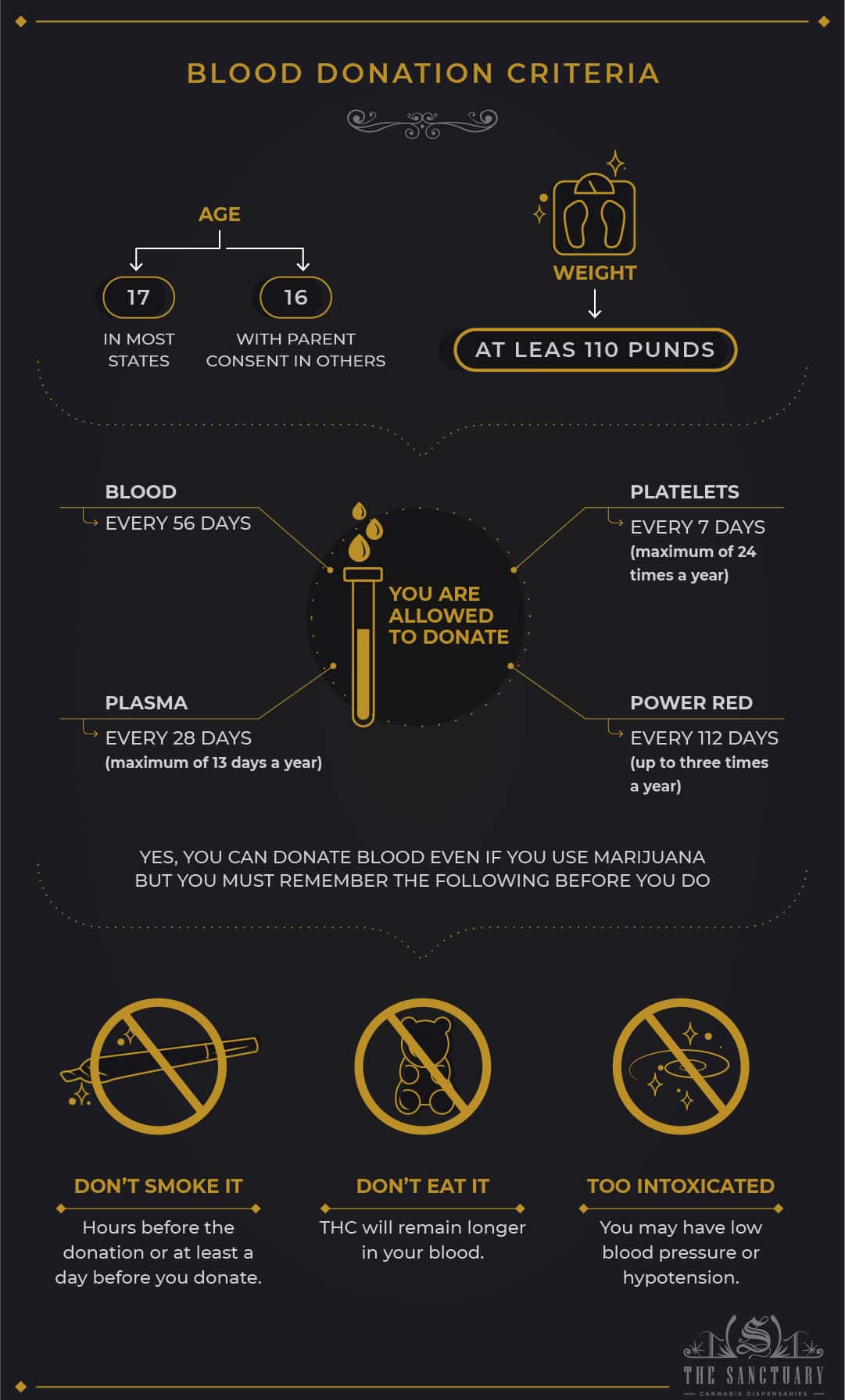Iftikhar Alam
Author
Reviewed by Cannabis Experts
Published on: October 22, 2020 | Updated on: November 14, 2024
Table of contents
- Donating Blood
- What is Blood Plasma?
- What is a Plasma Donation?
- Uses of Plasma Donations
- Benefits of Plasma Donation
- What are the General Blood Donation Criteria?
- Can You Donate Plasma if You Smoke Weed? Precautions to Take Before Donating Plasma
- Should I Donate Blood Even Though I Smoke Weed?
- Can I Donate Plasma if I Have THC in My System?
- Regular vs. Occasional Cannabis Users
- Forms of Marijuana Not Allowed
- Conclusion
We all know that donating blood saves lives, but can you donate plasma if you smoke weed?
The quick answer is YES.
Smoking cannabis does not disqualify you from giving blood. However, the clinic will likely turn you away if you attend your appointment visibly high. Read now to learn everything you need to know.
Donating Blood
Every two seconds, a resident of this country needs blood. An estimated 4.5 million Americans require a blood transfusion annually.
Donating blood is vital, as every drop can save someone’s life. It is easy and takes only 10-12 minutes. Health experts also encourage everyone to donate blood, which is healthy.
The body replenishes lost blood, which enhances cardiovascular health and reduces the risk of cancer and obesity. The same goes for donating blood plasma.
Blood banks also welcome plasma donations. Blood plasma is used for treating trauma and severe bleeding.
What is Blood Plasma?
Blood plasma is a yellowish-colored liquid component of blood that delivers various proteins and cells to different areas of the body. When donated blood is left standing, it quickly separates from the plasma.
Plasma is vital as it helps us when we are sick. Blood plasma ensures that the body’s electrolytes are in check and prevents infections or the development of blood disorders. Patients use donated plasma to balance the body’s proteins and cells. The proteins can help detect and treat different diseases.
This is why all blood centers and hospitals are required to have a steady supply of plasma and other blood products.
What is a Plasma Donation?
In a plasma-only donation, the liquid portion of the donor’s blood is separated from the cells. Blood is drawn from one arm and sent through a high-tech machine that collects the plasma. The donor’s red blood cells and platelets are then returned to the donor with some saline. The process is safe and takes a few minutes longer than donating whole blood.
Donated plasma is frozen within 24 hours to preserve its valuable clotting factors. It can be stored for up to one year and thawed for transfusion to a patient when needed.
Uses of Plasma Donations
Doctors can use plasma to treat different kinds of severe health problems.
Some of the elements in plasma, including the antibodies and chemicals that help your blood clot, can help in medical emergencies like burns and trauma.
Other things that plasma donation is good for include:
- Developing Treatments: The antibodies and proteins can also be used to develop treatments for rare diseases, including some immune system problems.
- Cancer: Adults and children with different kinds of cancer, including leukemia, sometimes need plasma transfusions.
- Transplant Surgery: Some people who get liver or bone marrow transplants need plasma.
Benefits of Plasma Donation
Plasma donation has several advantages for both the donor and the receiver. Let’s talk about some of the key benefits.
Life-Saving Treatments
Plasma often provides therapies for those suffering from rare chronic diseases. It is also helpful in immune system disorders, such as hemophilia and respiratory issues, so plasma donation can be a life-saving treatment.
It is also helpful in making treatments or medicine for conditions like albumin, clotting, immunoglobulins, etc.
Compensation to Donors
Plasma donation centers also offer financial compensation to donors. So, why not make extra money as you help the community?
Better Monitoring
Plasma donation centers also perform basic health checks, such as blood pressure, pulse, iron levels, etc., of the donors before taking or accepting the donation, so it’s like getting a free health check every time you go for the donation.
What are the General Blood Donation Criteria?
 If you wish to donate blood and plasma, there are a few rules to consider. First and foremost, only apply if you are in good general health. In most states, the minimum age is 17 years. However, some states allow 16-year-olds to donate if they have parental consent. You also have to weigh at least 110 pounds.
If you wish to donate blood and plasma, there are a few rules to consider. First and foremost, only apply if you are in good general health. In most states, the minimum age is 17 years. However, some states allow 16-year-olds to donate if they have parental consent. You also have to weigh at least 110 pounds.
Incidentally, you are allowed to donate:
- Blood every 56 days
- Platelets every seven days (maximum of 24 times a year)
- Plasma every 28 days (maximum of 13 days in a year)
- Power Red every 112 days (up to three times a year)
Can You Donate Plasma if You Smoke Weed? Precautions to Take Before Donating Plasma
So, can you donate plasma if you smoke weed? If you wish to donate plasma smoking weed, take a few precautions to ensure safety for yourself and the receiver.
Wait for THC to Leave Your System
If you have active THC in your system, the plasma centers will not accept the donation. The recommended timeline to wait after using cannabis is 24 to 48 hours, after which you are free to donate plasma.
But again, there is no fixed time frame for this, and it also depends on the quantity and frequency of cannabis you intake.
Disclose your Usage
Be open with the plasma donation center about your weed usage. Tell them how often you take it and whether it’s for recreational or medical purposes.
Avoid Donating when Under Influence
If you are under the influence of any substance, it can affect your physical state. Not only the plasma donation centers will refuse you, but going under the influence can also increase the risk of dehydration, dizziness, and other complications for you.
Drink Up!
Marijuana is known to cause dehydration, so if you are going for plasma donation, it can become difficult or a bit uncomfortable for you. Make sure you drink lots of water before your appointment. Also, eat an iron-rich, nutritious meal before you go to keep your sugar levels up.
Check Local Laws
Also, check the local laws to avoid embarrassment. Many countries still haven’t legalized the use of marijuana, so their donation centers may have strict policies regarding donations by weed consumers.
Avoid Smoking/ Consuming Edibles Before the Donation
Avoid smoking hours before the donation or at least a day before you donate. This will ensure that THC is not in your blood.
Do not eat any cannabis edibles, either. They take longer to remove from your system, and thus, THC will remain longer in your blood.
If you are too high or intoxicated, you may have low blood pressure or hypotension. Having either of these can potentially prohibit you from donating blood.
Should I Donate Blood Even Though I Smoke Weed?
There is no legal obstacle to becoming a regular blood donor as long as you do not smoke marijuana immediately before the donation. Cynics will suggest that the blood of a cannabis user is unsuitable for a baby, infant, or toddler. However, it is essential to remember that the psychoactive compound THC will be gone by the time the blood is transferred to somebody else.
Can I Donate Plasma if I Have THC in My System?
Some donation centers allow you to donate plasma even if you have THC in your systems. But others may prohibit it. So, offering full disclosure and following rulings or guidelines is best.
Plasma centers do not conduct the test for weed on a routine, but if you appear visibly under the influence, they can decline your donation.
Regular vs. Occasional Cannabis Users
Can you donate plasma if you smoke weed every day?
The rules for blood donation are not any different for those who use cannabis often, rather than just every once in a while. Both regular and occasional users of cannabis can donate blood, provided that they meet all the other qualifications for blood donation.
THC does tend to take longer to exit your system if you are a regular user of cannabis. However, there is no danger that a donor-recipient can get a “contact high” from your marijuana-infused blood. Hence, you are in the clear whether you are a regular or occasional cannabis user.
Forms of Marijuana Not Allowed
You can donate if you have smoked marijuana. However, you cannot donate if you have smoked or ingested a synthetic form of the drug.
Synthetic marijuana, also known as K2 or Spice, is a human-made chemical with a similar makeup to the marijuana plant. It is classified under the group called new psychoactive substances (NPS) and is considered to be an unregulated, mind-altering substance.
There is an FDA-approved medication called Marinol that has man-made THC in it. If you are taking Marinol for a medical condition, such as nausea from chemotherapy or loss of appetite from HIV infection, you would not be eligible for blood donation. If you have taken Marinol and do not have a pre-existing medical condition, you would not be deferred, as it is FDA-approved.
Conclusion
The straightforward answer to “Can you donate plasma if you smoke weed?” still stands as “Yes.”
However, you need to be mindful of certain legalities. Some centers aren’t that stringent, while others have specific regulations or waiting periods regarding safe donations.
So long as you disclose your usage and follow their guidelines, you can still support a noble cause.
Sources
Footnotes
- Beurel A, Terrade F, Lebaudy JP, Danic B. Determinants of plasma donation: a review of the literature. Transfusion clinique et biologique. 2017;24(3):106-9.
- Thorpe R, Masser BM, Nguyen L, Davison TE. Understanding donation frequency: insights from current plasma donors. Vox Sanguinis. 2020;115(2):174-81.
- Hellstern P, Muntean W, Schramm W, Seifried E, Solheim BG. Practical guidelines for the clinical use of plasma. Thrombosis Research. 2002;107:S53-7.
- Peters FT, Maurer HH, Hellstern P. Prevalence of illicit drug use in plasmapheresis donors. Vox sanguinis. 2003;84(2):91-5.
- Expert Working Group. Guidelines for red blood cell and plasma transfusion for adults and children. CMAJ: Canadian Medical Association Journal. 1997;156(11):S1.
References
- Can You Donate Blood If You Use Cannabis?. The American National Red Cross. Accessed 4/7/2024.
- Can You Give Blood If You Smoke?. Healthline. Accessed 4/7/2024.
- Can you smoke and donate blood?. Medical News Today. Accessed 4/7/2024.
The content provided on this blog is for informational purposes only and does not constitute medical, legal, or professional advice. Cannabis use is subject to local laws and regulations, which vary widely by jurisdiction. Always consult with a healthcare professional before starting any new treatment or altering an existing treatment regimen. The authors and publishers of this blog are not responsible for any actions taken based on the information provided herein. Use cannabis responsibly and in accordance with applicable laws. This blog is intended for adults aged 21 and over. The Sanctuary Dispensaries D186, D187.








